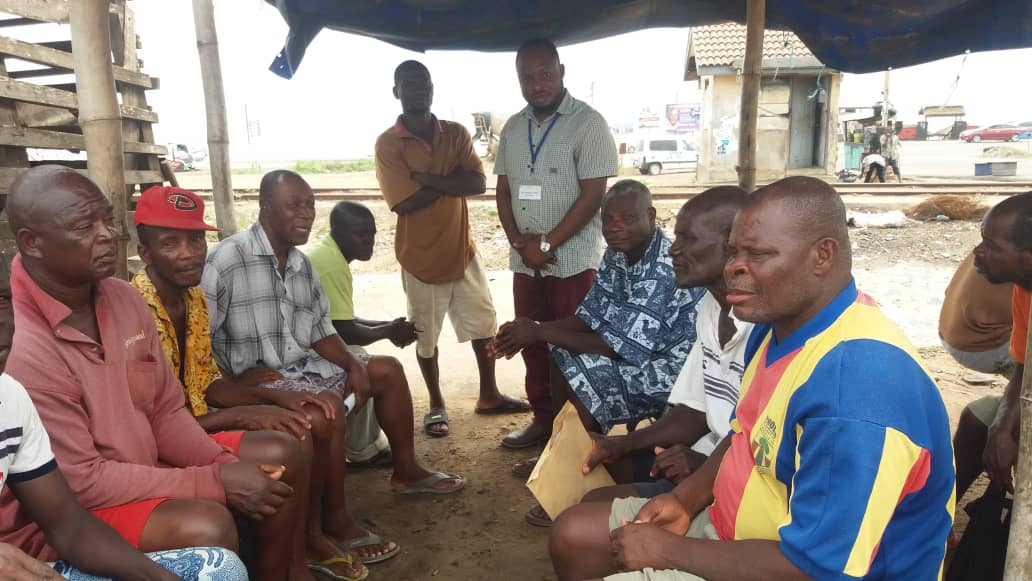- Graduate School GLOMAR
- PhD student reports
- Field Campaigns
- Eric Tamatey Lawer
Eric Tamatey Lawer
Report of GLOMAR PhD student Eric Tamatey Lawer about his Field Campaign in West africa from 20 March to 27 July 2018
I embarked on my third (also the last) field trip for my doctoral research between 20 March 2018 to 27 July 2018 to West Africa. Four key things were done during this period. These include conducting data confirmation exercises, conducting additional interviews and participant observations, writing work on manuscripts and discussing aspects of the transcripts/interview data with experts. I present the major activities carried out and the methods used below under three subsections: phase 1, phase 2, phase 3 which relates to different parts of the fieldwork. The overreaching theme of my PhD research is to explore recent discourses and practices of sustainable port development and management that is framed as the ‘green port’ concept and the actors and networks promoting ideas of the ‘green port’ concept in European and West African contexts.
Phase 1: Data confirmation and additional interviews/participant observation
Between 22 March 2018 and 30 May 2018, I embarked on data confirmation exercises and also conducted additional interviews. Since environmental and social issues play a key role in port competiveness in recent times and some of my interviewees in the previous interviews were strict about issues of confidentiality, it was prudent to first of all meet with some of these people to go through the interview notes and/or transcripts to make sure that what I captured from the interviews conducted earlier on with them was exactly what they meant and to give clarity where necessary. This included informants from organisations including: The Ports Environmental Network for Africa (PENAF), the port of Tema, Meridian Ports Services (a terminal operating company), Ghana Ports and Harbours Authority, Port Autonome de Abidjan (Cote d’Ivoire) and the Environmental Protection Agency, Ghana. Whiles in Ghana, I contacted the people involved to arrange appointments for a meeting or for them to confirm statements and positions where appointment for interviews were not going to be possible. On the agreed dates in both instances, we went through notes and I confirmed details or tried to identify issues where they wanted to rectify or specify earlier statements. By this method, I was able to complete interview data and add missing points to achieve more rigorous results. This method ensures that qualitative data becomes credible and dependable.
Additional interviews were also conducted within this period. Interviews conducted mainly focused on how the ports of Tema and Abidjan implemented ISO 14001 environmental standards for greening their ports. This was to understand how standards change as they travel across time and space. In Ghana, interviews also focused on exploring stakeholder’s views about the ongoing port expansion project at Ghana’s largest port of Tema, the emerging conflicts and how ideas about ‘green ports’ could have helped to reduce such conflicts. In Ghana, additional interviews were held with officers from the Ghana Standards Authority, the Ghana ports and Harbours Authority, Various stakeholders and concerned persons involved in the Tema port expansion project including traditional leaders and private resource developers. A focus group discussion was also held with the Sakumono fishing community due to its proximity to the new port expansion project. For Cote d’Ivoire, interviews were held with officers from the National Environmental Agency of Cote d’Ivoire (ANDE), Anti-Maritime Pollution Authority (CIPOMA) and the Ivorian Agency of Normalization (CODINORM). These additional interviews were vital to achieving the overall objectives of the research.
Phase 2: Writing work
During the course of the field work, I also continued with writing work. First, the additional interviews that was conducted were evaluated and organized in a meaningful way in order to identify statements made by the interviewees that can help to answer my research questions. Also, I continued with writing work on my first manuscript entitled: ‘‘transnational networks for the ‘greening’ of ports: Learning from best practices?’’. During this period, I did further analysis and changed most parts of the theoretical framework. I started work on a second manuscript entitled ‘‘Examining stakeholder participation and conflicts associated with large scale infrastructure projects: The case of Tema port expansion project’’ and currently waiting for review comments on the draft from my supervisors.
Phase 3: Discussions with experts in Ghana
During this period, contacts were also made with some of the professors and experts at the University of Ghana. I had fruitful discussions with two professors about my project. I got interesting opinions with regards to my approaches and recommendations about how I could further improve the research. Discussions were also held about how my current research fits into my long term scientific interest and possibilities to get a position at universities in Ghana after I complete my doctoral studies. This period helped me to develop important networks in both academic and personal terms.
General impressions and conclusion
In general, I consider the field trip as very successful. Despite a few challenges as to be expected, my objectives for the field trip were achieved as I have the necessary data set for my PhD thesis. I am grateful to the Sustainability Research Center (artec), the University of Bremen and the Deutscher Akademischer Austauschdienst (DAAD) for the diverse roles they played in making it possible for me to embark on this field trip.



